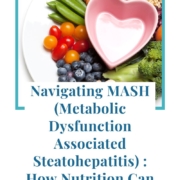March is National Nutrition Month, a time dedicated to highlighting the importance of making informed food choices and developing healthy eating habits. As we delve into this month’s theme, it’s crucial to shed light on a condition that intersects with nutrition in a significant way: Metabolic Dysfunction-Associated Steatohepatitis (MASH), formerly known as NASH (Non-Alcoholic Steatohepatitis). MASH is a progressive form of metabolic dysfunction-associated steatotic liver disease (MASLD), characterized by liver inflammation and damage. With its prevalence on the rise, understanding the role of nutrition in managing MASH becomes paramount.
Understanding MASH
Before delving into the nutritional aspects, let’s grasp the basics of MASH. Unlike MASLD, which involves the accumulation of fat in the liver without inflammation, MASH involves inflammation and liver cell damage, resembling the effects of alcohol-induced liver damage but occurring in individuals who consume little to no alcohol. Over time, MASH can progress to more severe conditions like cirrhosis or liver cancer, emphasizing the urgency of effective management strategies.
The Impact of Nutrition
While there’s no specific diet to cure MASH, adopting a healthy eating pattern can play a pivotal role in managing the condition and preventing its progression.
Here are some key dietary considerations:
1. Mindful Macronutrient Balance: A balanced diet that includes adequate protein, healthy fats, and complex carbohydrates can help manage weight and improve metabolic health, which are crucial in MASH management.
2. Limit Added Sugars and Refined Carbohydrates: Excessive intake of added sugars and refined carbohydrates can contribute to insulin resistance and worsen liver health. Opt for whole grains, fruits, and vegetables instead.
3. Embrace Healthy Fats: Incorporating sources of healthy fats like nuts, seeds, avocados, and fatty fish can have anti-inflammatory effects and support liver health.
4. Moderate Alcohol Consumption: While MASH isn’t caused by alcohol, limiting alcohol consumption is essential for overall liver health and can prevent further liver damage.
5. Portion Control and Caloric Intake: Controlling portion sizes and monitoring caloric intake is vital for managing weight, as obesity is a significant risk factor for MASH progression.
6. Focus on Nutrient-Dense Foods: Prioritize nutrient-dense foods rich in vitamins, minerals, and antioxidants, such as leafy greens, berries, cruciferous vegetables, and lean proteins.
Seeking Professional Guidance: Individualized dietary recommendations are crucial in managing MASH, as nutritional needs may vary depending on factors like age, weight, metabolic health, and the stage of liver disease. Consulting a registered dietitian or healthcare provider is essential to develop a personalized nutrition plan tailored to one’s specific needs and health goals.
In conclusion, nutrition plays a pivotal role in managing MASH and promoting liver health. By adopting a balanced diet rich in whole foods, limiting harmful dietary components, and seeking professional guidance, individuals can take proactive steps toward managing MASH and improving their overall well-being. As we celebrate National Nutrition Month, let’s empower ourselves with knowledge and make informed food choices to support liver health and overall vitality.

